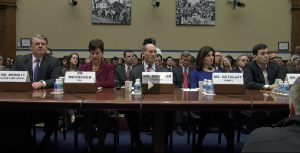Beating Martin Shkreli is Not Leadership
By Givi Topchishvili of 9.8 Group
 Let me begin by admitting that I haven’t watched a Congressional Hearing since Michael Corleone had to stare down angry lawmakers in the Godfather Part II. Little did I know how accurately a 1974 Hollywood scene portrayed the reality I saw on 2016 CSPAN airing of the Congressional Hearing on the Prescription Drug Market. The theatrics, the drama, and emotions were so perfectly done, I had a hard time seeing the fine line between fiction and the reality. And that to me is a problem.
Let me begin by admitting that I haven’t watched a Congressional Hearing since Michael Corleone had to stare down angry lawmakers in the Godfather Part II. Little did I know how accurately a 1974 Hollywood scene portrayed the reality I saw on 2016 CSPAN airing of the Congressional Hearing on the Prescription Drug Market. The theatrics, the drama, and emotions were so perfectly done, I had a hard time seeing the fine line between fiction and the reality. And that to me is a problem.
The policies relating to public health are highly consequential to governance and should not be taken lightly even by those of us who believe in a smaller government. Quality, access, and affordability of healthcare are vital to a society. It effects individuals and businesses. It effects government spending. It effects innovation and a major slice of the economy.
That’s why I found it perplexing that everything I saw boiled down to a show. There was a lot of self-righteous indignation, moralizing, and finger-pointing. On the other side of the isle was a perfect lineup of the worst examples of corporate greed and speculation, that happened to end up in the pharma business. It was a well-orchestrated show, evidently deeply steeped in traditions. Is that what we call leadership?
As I write this, major changes are happening in different parts of the world with regards to cost of pharmaceutical drugs. Japan, facing an aging population and a massive government debt burden, now has Prime Minister Shinzo Abe’s government insisting on price cuts on branded drugs and pushing for a speedier transition to generics. The government has said that in the next few years it would like to see generics make up about 80 percent of prescriptions in Japan from about 50 percent now. It also makes friendlier business environment for smaller companies like Israel’s Teva Pharmaceutical and India’s Sun Pharmaceutical, among others. The Japanese government identified a tangible problem and found a tangible solution.
In the UK, under pressure from consumer advocates, the government is considering overriding a patent for one major branded medication, pay its developer a compensation – process known as compulsory licensing – and authorize a company to make cheap generic copies. The case is still pending, but in a sign that the pressure is real the maker was already forced to slash pricing on the drug, although it wouldn’t disclose by how much.
Meanwhile back home in the United States, we get great reality TV of a group of lawmakers beating down on Martin Shkreli without offering any real solutions. The anticipated FDA review time for new drugs is still at least 10 to 15 months, officially, while in reality it could take years. The border to entry is still prohibitively complex and expensive. There is no mechanism in place to open the market up to more competition, or ways to expedite approval of medicines that are proven to be effective in other parts of the world.
At the same time, legal loopholes in the tax code and complex offshore schemes allow multinational entities to facilitate tax evasion. The structure of our insurance compensation policies and conjunction with HIPPA rules make it easy for some companies to charge double or triple the price as they do in other parts of the world for the same medication. That leverage is then used to undercut competition in other parts of the world, compensating for the losses at the expense of American patients and insurance companies.
Yes, there are many problems in the pharma industry, but whatever problems might exist will be easier to resolve if the government actually focused on their responsibilities and made the regulatory environment more open to transparent business practices and scientific innovation. But that takes real leadership, which is a lot more difficult than beating down on caricatures of the worst elements in any industry.

